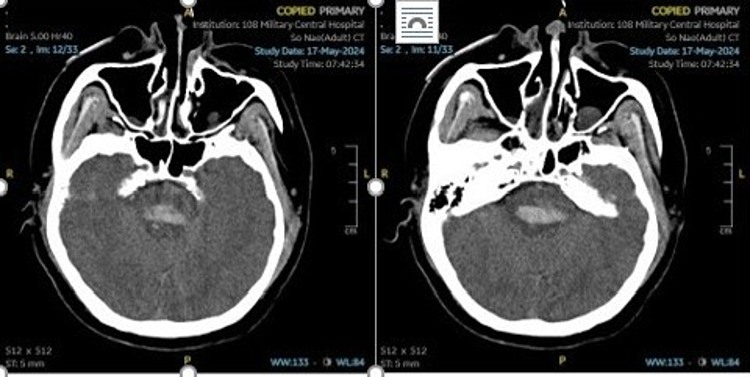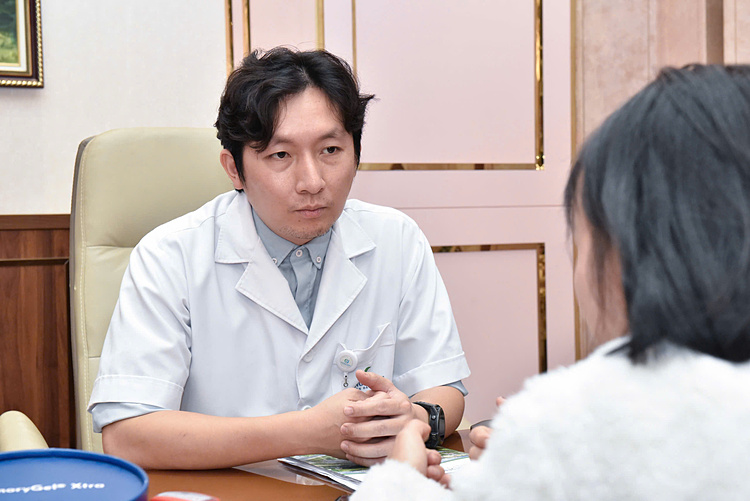"It's probably just the coffee and deadlines," he told the doctor, dismissing the advice. He frequently worked through the night, fueled by strong black coffee, ate irregularly, and consumed a lot of alcohol. Occasional headaches and slight dizziness upon standing were attributed to fatigue or lack of sleep.
One morning, he collapsed in the bathroom, his face drooping and limbs paralyzed. At the hospital, he was diagnosed with a stroke caused by uncontrolled hypertension.
Doctor Doan Du Manh, a stroke and vascular specialist and deputy director of Phuong Dong General Hospital, confirmed severe damage to the left side of Nguyen's brain, resulting in slurred speech and weakness on his right side. Nguyen now faces a long road to recovery, initially unable to care for himself.
Doctor Nguyen Tien Dung, deputy director of the Stroke Center at Bach Mai Hospital, recalls a similar case of a 30-year-old man who also ignored his high blood pressure. Hospitalized twice, the man arrived in a coma, requiring intubation, with his blood pressure persistently at 180/100 mmHg, unresponsive even to intravenous medication.
This patient had a history of a brain hemorrhage due to hypertension 4 years prior. After stabilizing, he was discharged with medication. However, when his blood pressure normalized, he mistakenly believed he was cured and stopped taking his medication.
Doctors deemed surgery unlikely due to the extensive bleeding in both sides of his brain and his deep coma. He was placed on life support, with a grim prognosis.
 |
CT scan of a stroke patient due to hypertension. Photo: Hospital provided |
CT scan of a stroke patient due to hypertension. Photo: Hospital provided
Professor Huynh Van Minh, president of the Vietnam Heart Association, acknowledges Vietnam's high rate of stroke caused by hypertension complications. Many are unaware of their condition or disregard its seriousness.
According to the World Health Organization, global hypertension rates range from 23% to 37%, meaning one in every three or four people is affected. Hypertension is defined as systolic blood pressure above 140 mmHg, diastolic blood pressure above 90 mmHg, or currently using antihypertensive medication.
While the prevalence of hypertension has remained stable for 30 years, the number of diagnosed cases has doubled from 648 million in 1990 to 1.28 billion in 2019. This is attributed to an aging population, population growth, and increased detection. Low and middle-income countries, like Vietnam, have the highest rates. In Vietnam, 25% of men and 21.6% of women have hypertension, yet many struggle to achieve and maintain target blood pressure levels.
Controlling hypertension is challenging due to its often asymptomatic nature. Many remain undiagnosed, while those diagnosed often fail to adhere to treatment, taking insufficient medication or neglecting lifestyle changes.
Dr. Manh explains that hypertension is elevated pressure in the arteries due to the force of blood flow. This constant pressure can damage the artery walls, leading to both ischemic and hemorrhagic strokes.
Specifically, sustained high blood pressure can damage the endothelium, the inner lining of arteries. These tiny tears become sites for cholesterol and platelet buildup, forming plaques. Over time, these plaques narrow the arteries, restricting blood flow to the brain. If a plaque ruptures, it can form a blood clot, blocking blood flow and causing an ischemic stroke.
In hemorrhagic stroke, prolonged hypertension weakens blood vessels, particularly the small ones in the brain. These fragile vessels can rupture under high pressure, leading to bleeding in the brain.
In the kidneys, hypertension can cause acute kidney injury, chronic kidney disease, and eventually end-stage renal disease requiring regular dialysis. It can also impair vision, leading to blindness. Atherosclerosis can cause leg pain during exercise, even ulcers and gangrene requiring amputation. Hypertension can also contribute to erectile dysfunction, especially when combined with diabetes and smoking.
 |
Dr. Manh consults with a young patient with hypertension. Photo: Linh Dan |
Dr. Manh consults with a young patient with hypertension. Photo: Linh Dan
Experts observe that young people often underestimate the risks of hypertension, neglecting blood pressure monitoring, exercise, and healthy eating habits. They often have unhealthy diets leading to overweight and obesity, and avoid regular checkups, only realizing the severity when a serious health issue like a stroke occurs.
Those diagnosed with hypertension require lifelong medication and strict adherence to treatment plans, including regular checkups to adjust medication and detect complications early. Untreated underlying conditions, combined with other factors, can lead to strokes with severe complications and lasting disabilities.
For prevention, doctors recommend regular blood pressure checks, especially for those over 50 or with a family history. Pre-hypertension should be monitored regularly with medical evaluations to initiate timely treatment. Other preventive measures include reducing salt intake (below 5 g daily), quitting smoking, exercising at least 30 minutes daily, managing stress, and maintaining a healthy weight.
Thuy Quynh












